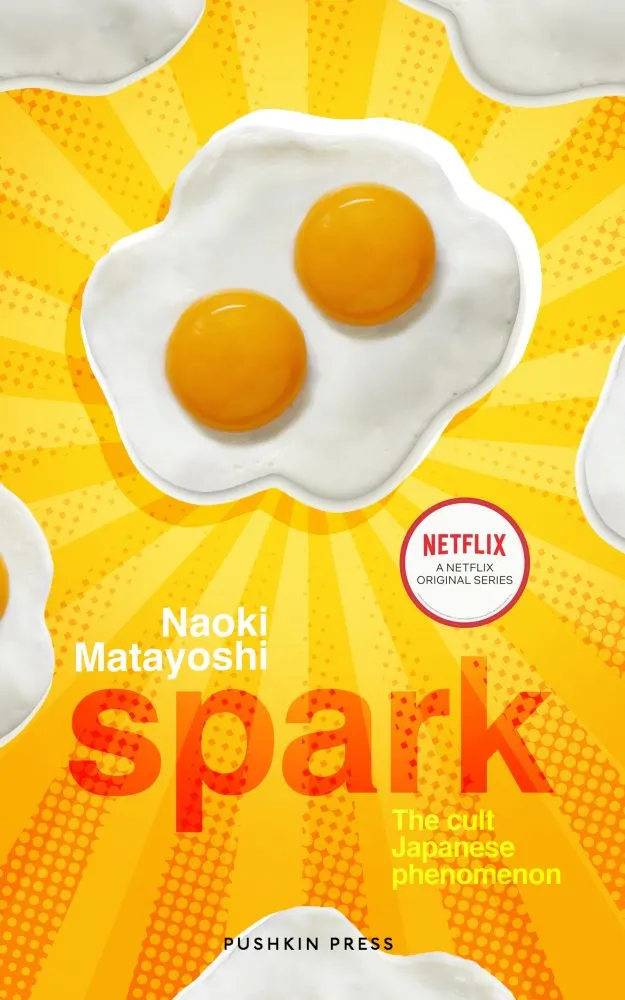Spark has been such an enormous success in Japan – selling more than three million copies – that it has now been adapted into a Netflix series. But what is it? Spark is a short novel about comedy and the lives of the people who create it. Written by Naoki Matayoshi, a successful comedian in his own right, the novel has captured the hearts of millions, and for good reason.
Spark does two things artfully: it highlights for English audiences the lesser-known but captivating Japanese tradition of manzai comedy, and it perfectly captures – even embodies – the rocky and clumsy journey that a friendship often takes.

Spark
Manzai is a traditional form of Japanese stand-up comedy performed by two men who bounce off each other rhythmically, with one usually playing the straight man and the other the fool. Our protagonist, Tokunaga, is only twenty.
Half of the manzai duo Sparks, he is fighting to be noticed in a crowded and brutal profession. Tokunaga is insecure and anxious, but he has enough courage to strain against the tide of competition and public indifference in order to realise his dream.
Kamiya is a strange an unknowable man. After meeting Tokunaga at a festival where they both performed, he agrees to become a sort of mentor to Tokunaga, but the two are so different, right down to their cores, that their approach to life, comedy, and even their own friendship creates a strained and uneasy brotherhood that lasts for years and forms the spine of a charming tale that gets under your skin like an itch you can’t scratch.
Matayoshi understands male friendship in a way that goes far beyond the kinds of things that forge and maintain that brotherly bond. In the construction and unravelling of Spark, he masterfully mimics the beats that a growing relationship hits.
The novel begins clumsily, with an unclear and messy characterisation of Kamiya and an unsettled pace. This is all done in service of reflecting the difficulties of forging a new relationship.
Read More: The Best Japanese Novels of 2020
Reading Spark is uncannily akin to entering an awkward new friendship with someone you don’t really know, trying to express yourself and define who you are, attempting to understand the other person. It’s messy and unwieldy. It’s not delicate and it’s unpredictable.
This is made all the more exciting and frustrating thanks to the actions and attitude of Kamiya. Tokunaga is not a hard man to figure out and, as our first-person narrator, he shouldn’t be.
His insecurities, his tenacity, and his boyish nature are plain to see and easy to empathise with. Kamiya, however, is something of an adventure. Just a few years older than Tokunaga, he leans into the wild world of surrealism and strangeness, even offstage. Though it’s plain to see that his strangeness is compensation for his own fears and insecurities.
Kamiya is an oddball, but he is one that we have all met in some form or another: a loud, brash, sometimes rude man who uses comedy (even bad comedy) as a crutch. It’s how he survives and navigates the harsh world of adult life with all of its demands and its stresses.
Kamiya is cracked and fragile, but he has put on a front of comedy for so long that he no longer knows this himself, and god forbid anyone else ever sees through his façade. This is what leads him to dedicate more and more of himself to his comedy, even if it takes him nowhere.
Moving parallel to the blossoming friendship between Tokunaga and Kamiya is the career of Sparks. While Tokunaga’s manzai partner, Yamashita, is an unfortunately underdeveloped character in the novel, their bond is strong enough to carry them into something resembling success, though that road is hard.
Their relationship is far more explored, through Tokunaga’s perspective, than Yamashita’s own personality is, but it works for the narrative of the novel.
Spark is a short novel that manages to comfortably and succinctly, yet deeply explore the dynamics of brotherly relationships from various angles. These men are bound by their love of manzai, with Kamiya claiming that he was born a manzai comedian and will die one; they are drinking buddies and colleagues; they are senpai and kohai – mentor and mentee – they fight and disagree; they twist each other’s arms and pull each other’s legs.
It is their dynamic, far more than their journey, that keeps this novel changing gear but forging on ahead regardless. And because of these frequent and awkward gear changes, Spark lacks fluidity. But once again this is an almost allegorical reflection of the themes and experiences tied up with a long-lasting and tightly wound friendship.
Despite it being a comedy novel written by a comedian about comedians, Spark isn’t particularly funny. There are some interesting scenes where we get to see what a manzai comedy show looks like, and the kind of comedy that comes from that stage, but only one of these scenes is particularly hilarious.
Admittedly, it did have me snickering out loud as I read, but it was the only time. Other than that, the comedy of Spark is more the kind that has you grinning at how awkward or silly it is. It’s sweet, corny, charming comedy rather than laugh-out-loud comedy. It might be argued that this is down to the translation, but Alison Watts has done such a stellar job in every other area that I wouldn’t dream of placing any blame on her translation.
In fact, Watts shows such a deft and detailed understanding of Kamiya’s character that, through her translation, he felt so knowable, so relatable. He reminded me of people in my own life that I have met.
His layered personality was such a joy to examine from the intimate perspective that Tokunaga provides, and it’s thanks to Watts’ translation that we are able to do this.
Kamiya is a tragic character woven into a comedic world. He insists that he is funny, that his life and his career is all comedy, and yet there is tragedy laced in his words and his actions. The lengths he goes to for comedy are sometimes enough to make you weep with pity for him.
He is the driving force of this novel, but that’s not to say you won’t enjoy your time embodying Tokunaga and taking that punishing yet rewarding manzai journey with him.
Conclusion
Spark is a novel that lives and dies not on the success of its comedy, but on the empathy forged by its characters. Tokunaga embodies volition; he lives through anxiety, insecurity, and desperation.
He is uplifting yet grounding. But ultimately it is Kamiya who behaves like a car crash you can’t look away from. He is an outwardly funny man you’d love to drink with, but an inwardly tragic character you so desperately hope to save. Kamiya can’t be saved, though; he lives for comedy, even if it might kill him.
I so frantically loved my time with these men in all the journeys they took together: their rambling drunken conversations and their failed attempts at comedy.
Their sober days of introspection and their small successes on the stage. They are flawed but infinitely likable and endearing characters that carry the story of Spark to its end and, after that, they’ll sit comfortably in your ear, whispering bad jokes that you’ll love to hear.
